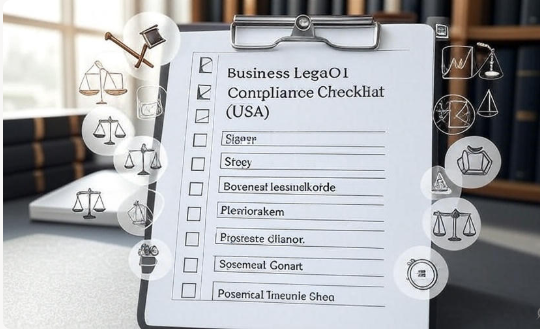Staying compliant with legal requirements is a critical obligation for every business operating in the United States. Whether you’re running a startup or managing a growing enterprise, legal compliance isn’t just about avoiding penalties—it’s about building a sustainable, trustworthy operation. With constantly evolving laws and regulations, especially in 2025, it can be overwhelming to know what needs to be done and when.
This guide provides a comprehensive Business Legal Compliance Checklist (USA) that addresses essential annual, quarterly, and ongoing legal tasks. It is designed to help U.S. business owners, executives, and compliance professionals maintain their good standing, avoid costly fines, and ensure long-term success. The checklist also includes practical steps, timelines, and insights to help you navigate compliance with confidence.
Why Legal Compliance Matters
Legal compliance serves as the backbone of operational integrity and risk management for any U.S. business. Here are key reasons why it matters:
- Avoid Penalties and Fines: Federal and state agencies impose financial penalties for missed filings, incorrect classifications, or other non-compliant actions.
- Maintain Business Operations: Failing to renew a license or file required documents can lead to business suspension or forced closure.
- Safeguard Reputation: Legal missteps can damage brand image, especially in industries with public exposure.
- Attract Investors: Investors perform due diligence, and businesses with clean compliance records are more attractive.
- Reduce Risk of Litigation: Proactive compliance mitigates legal risks and prevents disputes.
1. Business Structure and Internal Governance
Choose the Right Entity Structure
One of the first and most critical decisions you make when starting a business is selecting the correct legal entity type. Options include:
- Sole Proprietorship: Easiest to form but offers no personal liability protection.
- Partnership: Offers shared responsibility but also shared liability.
- Limited Liability Company (LLC): Offers flexibility and personal liability protection.
- Corporation (C-Corp or S-Corp): Offers greater fundraising potential but requires more formalities.
The entity structure impacts everything from taxes to how decisions are made.
Internal Governance Documents
Once you establish your structure, you must maintain internal documents:
- LLCs should draft and follow an Operating Agreement.
- Corporations must adopt Bylaws and hold regular Board and Shareholder meetings.
- Meeting Minutes and Board Resolutions must be documented and stored.
These documents protect your business in audits or legal disputes and show a pattern of responsible governance.
Filing Requirements
Most states require:
- Annual Reports or Biennial Statements: Required filings to maintain good standing with the Secretary of State.
- State-specific Fees: These vary and must be paid on time.
Pro Tip: Missing these filings may lead to administrative dissolution of your business entity.
2. Federal and State Tax Compliance
Federal Tax Obligations
- Employer Identification Number (EIN): Required for hiring employees and filing taxes. Apply via the IRS website.
- Federal Income Tax: Corporations use Form 1120; partnerships use Form 1065; sole proprietors use Schedule C.
- Self-Employment Tax: Covers Social Security and Medicare. Required for freelancers and small business owners.
- Estimated Taxes: Generally due quarterly for self-employed individuals and some small businesses.
- Payroll Taxes: Includes Social Security, Medicare, and federal unemployment taxes (FUTA). Use IRS Forms 940 and 941.
State and Local Taxes
Depending on your location, you may owe:
- State Income Tax: Based on net business income.
- Franchise Tax: Required in many states like Texas and Delaware.
- Sales and Use Tax: Businesses selling taxable goods or services must register and remit.
- Business Personal Property Tax: Assessed on furniture, fixtures, and equipment in some states.
Tax Deductions and Credits
Stay updated on:
- Section 179 Expensing
- R&D Tax Credits
- Work Opportunity Tax Credit (WOTC)
A tax professional can help identify tax-saving opportunities.
3. Business Licenses and Permits
Federal Licensing Requirements
Not all businesses require federal licenses, but certain industries do:
- Transportation and Logistics: Department of Transportation (DOT)
- Alcohol, Tobacco, Firearms (ATF): Bureau of Alcohol, Tobacco, Firearms and Explosives
- Broadcasting: Federal Communications Commission (FCC)
- Finance and Investment: Securities and Exchange Commission (SEC)
State and Local Permits
Common state/local permits include:
- General Business License
- Sales Tax Permit
- Zoning and Land Use Permits
- Sign Permits
- Environmental Permits
Be aware of industry-specific and city/county-specific requirements.
4. Corporate Transparency Act and BOI Reporting
Background
As of 2024, the Corporate Transparency Act mandates reporting of Beneficial Ownership Information (BOI) to FinCEN.
Who Must File?
Most U.S. corporations, LLCs, and similar entities must file unless exempt. Exemptions include:
- Large operating companies (20+ full-time employees and $5M in revenue)
- Publicly traded companies
- Certain nonprofits
Required Information
- Full legal name
- Residential or business address
- Date of birth
- ID number (e.g., driver’s license or passport)
Filing Deadlines
- Existing Businesses (before Jan 1, 2024): File by Jan 1, 2025
- Newly Formed Entities (after Jan 1, 2024): File within 30 days of formation
Failure to comply may result in civil penalties up to $500 per day.
5. Employment and Labor Law Compliance
Hiring and Onboarding
- Form I-9: Verifies employment eligibility
- W-4 and State Withholding Forms
- Job Descriptions: Clearly outline roles, responsibilities, and classification (employee vs. contractor)
Federal Employment Laws
- FLSA: Governs minimum wage, overtime, and classification
- ADA: Protects disabled workers from discrimination
- FMLA: Grants family and medical leave
- EEO Laws: Prevent discriminatory practices
Posters and Notices
Post federally mandated posters in visible areas. Requirements vary by state but generally include:
- Employee Rights under the FLSA
- OSHA Workplace Rights
- EEOC Notices
Benefits Compliance
- Affordable Care Act (ACA): Employers with 50+ full-time employees must offer coverage
- COBRA: Continuation of benefits after job loss
- 401(k) and Retirement Plans: Must adhere to ERISA standards
6. Data Privacy and Cybersecurity
Regulatory Compliance
Businesses that collect or store personal information must comply with various regulations:
- GDPR (if dealing with EU customers)
- CCPA/CPRA: Applies to businesses with California consumers
- HIPAA: Applies to health information handlers
Best Practices
- Encrypt sensitive data
- Use two-factor authentication (2FA)
- Maintain a breach response plan
- Limit employee access to data
- Provide cybersecurity training
Privacy Policies
- Include how data is collected, stored, used, and shared
- Provide opt-out mechanisms
- Stay current with state and federal privacy laws
7. Environmental and Industry-Specific Compliance
Environmental Laws
Businesses may be subject to:
- Clean Air Act
- Clean Water Act
- Resource Conservation and Recovery Act (RCRA)
If you produce hazardous waste, you must comply with EPA guidelines and submit reports.
Industry Requirements
- Construction: Follow building codes, OSHA regulations, and state licensing boards
- Healthcare: Compliance with HIPAA, HITECH, and state-specific patient safety laws
- Finance: Adhere to SEC, FINRA, and CFPB regulations
- Food Services: Health inspections, FDA regulations, and local food safety laws
8. Contracts, Insurance, and Internal Policies
Contractual Risk Management
- Draft clear vendor and client agreements
- Include termination clauses, indemnities, and governing law provisions
- Review NDAs and employment agreements annually
Required Business Insurance
- General Liability Insurance
- Professional Liability Insurance
- Product Liability Insurance
- Cyber Insurance
- Workers’ Compensation
Internal Policies
- Create a compliance calendar with all important deadlines
- Maintain a central repository of licenses and contracts
- Conduct internal audits semi-annually
9. Annual, Quarterly, and Ongoing Compliance Checklist
Annual
- File federal and state income tax returns
- Renew all licenses and permits
- Update internal documents and agreements
- Conduct board meetings and record minutes
- Submit BOI report (if applicable)
- Review insurance coverage
Quarterly
- Pay estimated taxes
- File payroll tax returns
- Conduct financial and operational reviews
- Distribute shareholder or partner updates
Ongoing
- Monitor legal changes
- Train staff on legal and operational compliance
- Document all internal processes
- Maintain clear financial and legal records
FAQs
What is a Business Legal Compliance Checklist (USA)?
A Business Legal Compliance Checklist (USA) is a structured framework that outlines the critical legal responsibilities businesses in the U.S. must fulfill. It includes tasks related to business structure, taxation, employment law, licensing, data protection, and more.
How often should a business perform compliance reviews?
Businesses should perform a thorough compliance review at least once a year, with quarterly check-ins to manage tax payments, employee classification, and regulatory updates.
What are the consequences of non-compliance?
- Financial penalties and late fees
- Legal actions and litigation
- Loss of business licenses
- Reputational harm
- Disqualification from government contracts
Can software help with compliance management?
Yes, compliance software solutions can automate filings, generate reminders, and store documentation to simplify compliance processes and reduce risk.
Is the BOI filing mandatory for single-member LLCs?
Yes, unless they qualify for one of the exemptions, single-member LLCs are also required to file under the Corporate Transparency Act.
Conclusion
Legal compliance is essential to long-term business success and sustainability. The Business Legal Compliance Checklist (USA) presented here covers the most critical obligations faced by businesses in 2025. While some items on this list may vary depending on your industry and location, adhering to these fundamentals will place you on a strong footing.
From BOI reporting to employment law and data privacy, staying ahead of these evolving rules ensures you remain in good standing and well-positioned for growth. Keep this checklist accessible, update it regularly, and don’t hesitate to seek expert legal or accounting advice to manage complex requirements.
With diligence, systems, and awareness, your business can confidently navigate the legal landscape and focus on what truly matters: growing your business and serving your customers.











